Recent Articles
Popular Makes
Body Types
2017 Electric Cars that get a Tax Credit or Incentive
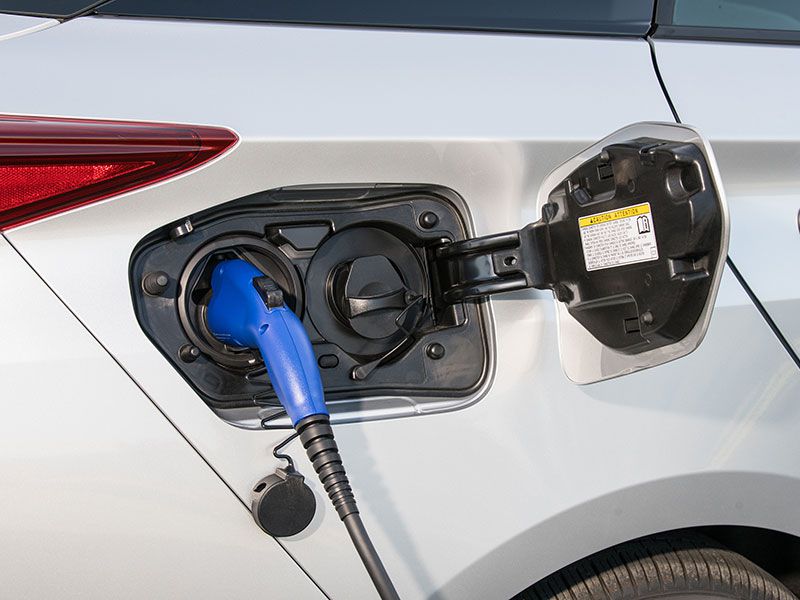
2017 Toyota Prius Prime plug in charging ・ Photo by Toyota
Uncle Sam wants to give you a big chunk of change as a reward for buying a new electric vehicle (EV). Pick up a new full electric or plug-in hybrid and you may be eligible for a federal income tax credit of up to $7,500. Tax credits are extremely attractive because they slash the total amount of income tax you owe. These are not mere deductions. A $7,500 credit will reduce your annual tax bill by $7,500. If you lease an electric vehicle, the tax credits usually go to the company holding the lease, not towards your tax bill.
Federal tax credit amounts are based on battery capacity. The larger the battery, the larger the potential credit. Some states (including California, South Carolina, Tennessee, New York, and Connecticut) provide additional tax incentives. Our list of tax credit-eligible EVs and plug-in hybrids focuses on vehicles with an MSRP of under $50,000 with current availability. New orders for the Tesla Model 3 will not be eligible for tax credits on delivery.
Volkswagen e-Golf
The fully electric 2016 Volkswagen e-Golf has a starting MSRP of $28,995 and is eligible for a Federal Tax Credit of $7500. A 3.6 kW onboard charger is standard. Charging the e-Golf’s 24.2 kWh battery pack via a standard 110/120-volt electrical socket takes approximately 20 hours. Charging via the optional 240-volt DC fast charging package ($1,675) and external charger takes less than four hours. The EPA estimates are 126 city/105 highway/116 combined MPGe with an electric range of 83 miles. The VW e-Golf’s AC synchronous permanent magnet motor produces 115 horsepower and 199 lb.-ft of torque, with a factory estimated 0-60 mph time of slightly over 10 seconds.

Photo by Volkswagen
Kia Soul EV
The roomy and versatile fully electric 2016 Kia Soul EV has a starting MSRP of $31,950 and is eligible for a Federal Tax Credit of $7500. Charging the Soul EV’s 27 kWh battery pack via a standard 120-volt electrical socket takes approximately 24 hours. Charging via a 240-volt external charger takes 4-5 hours. An 80% charge via a Level III CHAdeMO 480v charger takes approximately 33 minutes. The EPA estimates are 120 city/92 highway/105 combined MPGe with an electric range of 83 miles. The Soul EV’s AC synchronous permanent magnet motor produces 109 horsepower and 210 lb.-ft of torque, with a factory estimated 0-60 mph time of 11.2 seconds.

Photo by Kia
Fiat 500e
The retro-futuristic fully-electric 2016 FIAT 500e has a starting MSRP of $31,800 and is eligible for a Federal Tax Credit of $7500. Charging the electric Cinquecento’s 24 kWh battery pack via a standard 120-volt electrical socket takes just under 24 hours. Charging via a 240-volt external charger takes slightly under four hours. The EPA estimates are 121 city/103 highway/112 combined MPGe with an electric range of 87 miles. The 500e’s AC synchronous permanent magnet motor produces 111 horsepower and 147 lb.-ft of torque, with an estimated 0-60 mph time of slightly under nine seconds.

Photo by FCA Media
Chevrolet Bolt
The fully electric 2017 Chevrolet Bolt is a game-changer, with an EPA-estimated 238 miles of range. It has a starting MSRP of $37,495 and is eligible for a Federal Tax Credit of $7500. Chevrolet estimates that 25 miles of range are added for each hour of charging on a 240-volt external charger. A full charge of the 60 kWh battery pack via a 240-volt charger takes approximately 9.5 hours. Adding 90 miles of range via a DC fast charger takes approximately 30 minutes. The Bolt can also be charged via house current. The EPA estimates are 128 city/110 highway/118 combined MPGe. The Bolt’s permanent magnet motor produces 200 horsepower and 266 lb.-ft of torque, with a factory estimated 0-60 mph time under seven seconds.
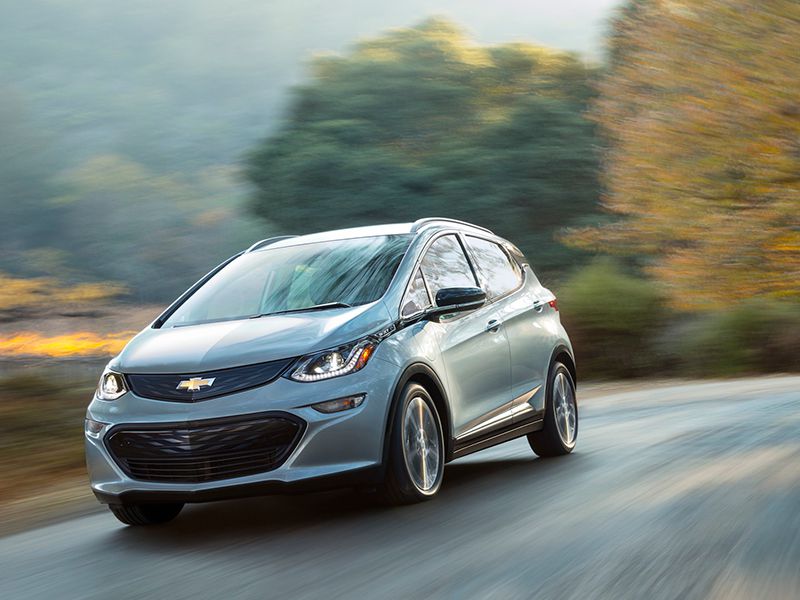
Photo by General Motors
Nissan Leaf
The 84-mile range fully electric 2016 Nissan LEAF S has a starting MSRP of $29,010 and is eligible for a Federal Tax Credit of $7500. The Leaf SV ($34,200) adds a quick charge port and range of 107 miles. Charging the Leaf SV’s 30 kWh battery pack via a standard 120-volt electrical socket takes approximately 26 hours. Charging via a 220-volt external charger takes approximately six hours. An 80% fast charge via a Level III charger takes approximately 30 minutes. The EPA estimates are 126 city/101 highway/114 combined MPGe. The Leaf SV’s AC synchronous electric motor produces 107 horsepower and 187 lb.-ft of torque, with a factory estimated 0-60 mph time in the 10-second range.
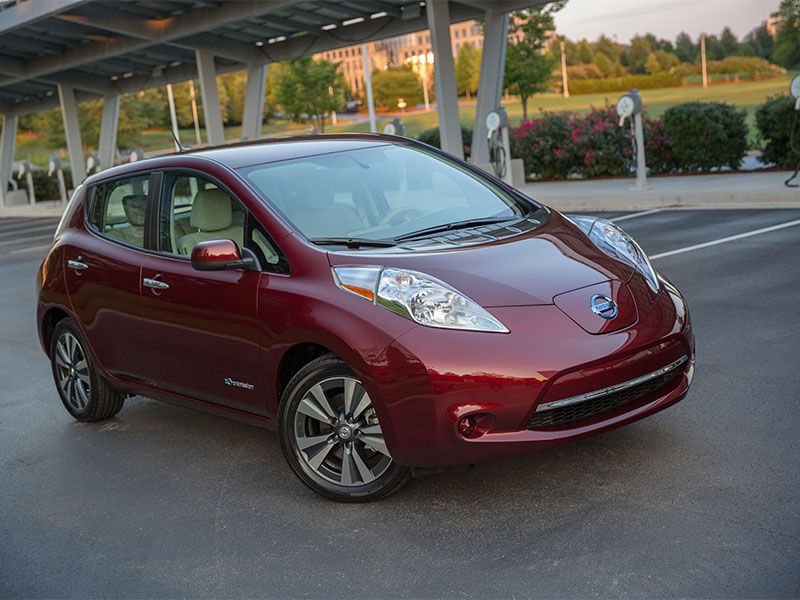
Photo by Nissan
BMW i3
The fully electric 2016 BMW i3 has a starting MSRP of $42,400 and is eligible for a Federal Tax Credit of $7500. Charging the i3’s 33 kWh lithium-ion battery pack via a standard 120-volt electrical socket takes approximately 16 hours. Charging via a 240-volt external charger takes 4.5 hours. A 30-40 minute charge on a DC Combo Fast Charger will yield an 80% charge. The EPA estimates are 137 city/111 highway/124 combined MPGe with an electric range of 114 miles. The i3’s AC synchronous electric motor produces 170 horsepower and 184 lb.-ft of torque. It’s the fastest EV in our list, with a factory-estimated 0-60 mph time of 7.2 seconds. The range extender-equipped i3 REX is EPA rated at 117 combined/39 miles per gallon combined when running on gasoline. The i3 REX has a total estimated range of 180 miles.
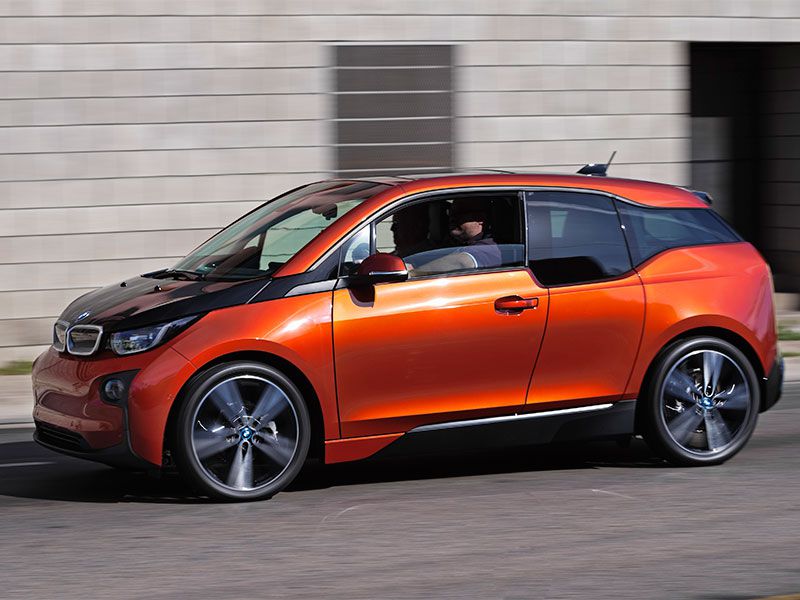
Photo by BMW
Chevrolet Volt
The second-generation extended-range electric 2016 Chevrolet Volt has a starting MSRP of $33,220 and is eligible for a Federal Tax Credit of $7500. Charging the Volt’s 18.4 kWh lithium-ion battery pack via a standard 120-volt electrical socket takes approximately 13 hours. Charging via a 240-volt external charger takes approximately 4.5 hours. The EPA estimates are 106 combined MPGe on gasoline and electric power, with 42 MPG on premium gasoline after the (53-mile range) battery has been depleted. The total estimated range is 420 miles. The Volt’s drivetrain produces 111 horsepower and 294 lb.-ft. of torque, producing a factory-estimated 0-60 mph time of 8.4 seconds. The Volt was named 2016 Green Car of the Year by Green Car Journal.
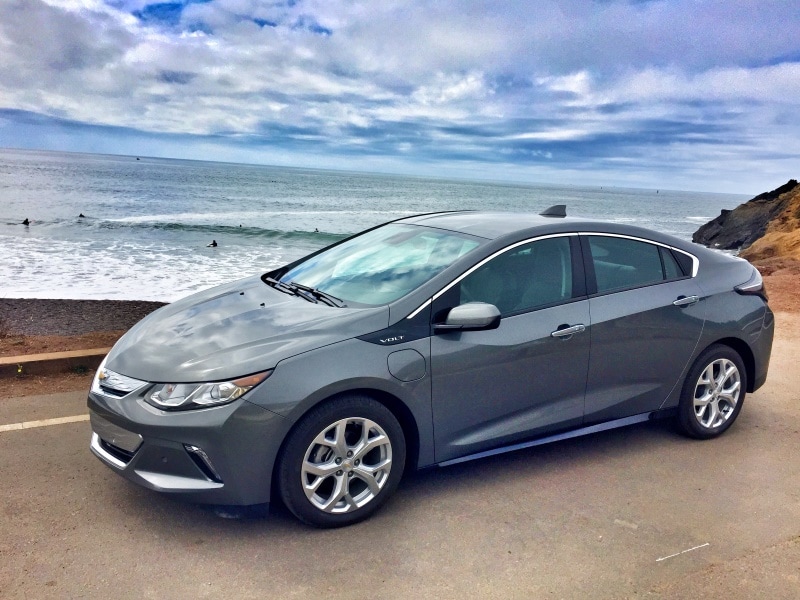
Photo by Lyndon Bell
Hyundai Sonata Plug-in Hybrid
The 2017 Hyundai Sonata Plug-In Hybrid sedan has a starting MSRP of $34,600 and is eligible for a Federal Tax Credit of $4,919, with a class-leading 27 miles of electric range. Charging the Sonata Plug-In Hybrid’s 9.8 kWh lithium-ion battery pack via a standard 120-volt electrical socket takes approximately nine hours. Charging via a 240-volt external charger takes less than three hours. The EPA estimates are 99 combined MPGe on gasoline and electric power, with 40 MPG on regular gasoline after the battery has been depleted. The total system driving range is over 600 miles, with a full battery and fuel tank. The Sonata Plug-In Hybrid’s hybrid drivetrain produces 202 net horsepower, which results in a 0-60 mph of under eight seconds.
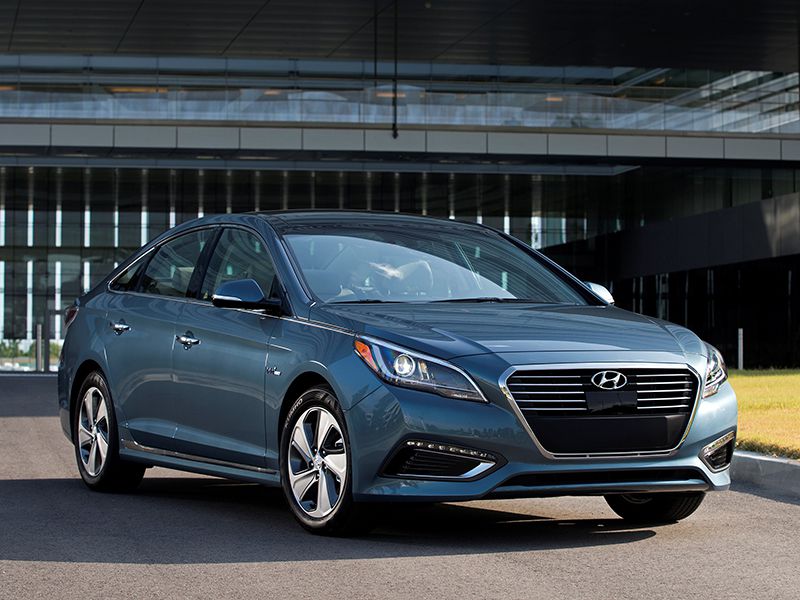
Photo by Hyundai
BMW 330e
The 2016 BMW 330e plug-in hybrid is the fastest entry on our list of tax credit-eligible EVs. It has a starting MSRP of $44,100 and is eligible for a Federal Tax Credit of $4,001. Charging the 330e’s 7.6 kWh lithium-ion battery pack via a standard 120-volt electrical socket takes approximately 3.5 hours. Charging via a 240-volt external charger takes approximately 2.2 hours. The EPA estimates are 72 combined MPGe on gasoline and electric power, with 31 MPG on premium gasoline after the (14-mile range) battery has been depleted. The 330e’s turbocharged 2.0-liter hybrid drivetrain produces 248 combined horsepower, propelling the sleek 4-door sedan to a factory-estimated 0-60 mph time of 5.9 seconds.
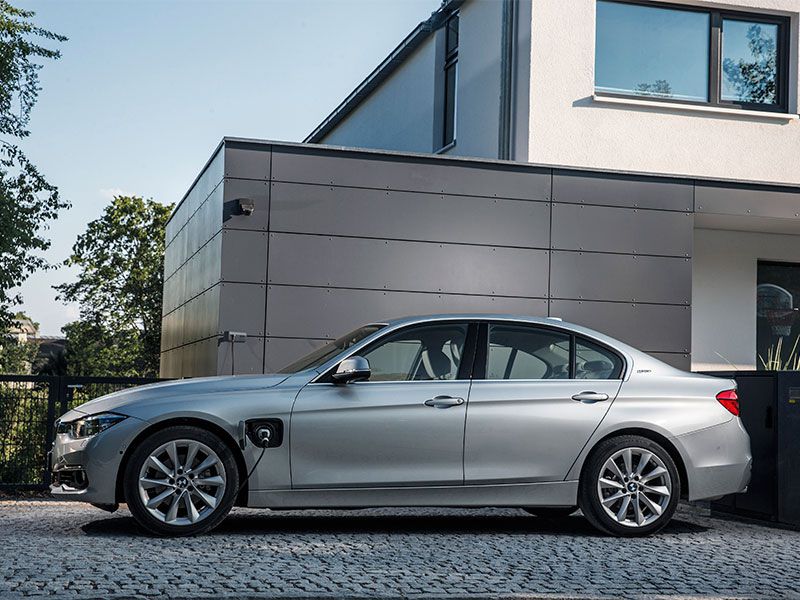
Photo by BMW
Audi A3 e-tron
The 2016 Audi A3 e-tron is one of the quickest plug-in hybrids on the market. It has a starting MSRP of $38,900 and is eligible for a Federal Tax Credit of $4,502. Charging the A3 e-tron’s 8.8 kWh lithium-ion battery pack via a standard 120-volt electrical socket takes approximately eight hours. Charging via a 240-volt external charger takes approximately two hours and 15 minutes. The EPA estimates are 83 combined MPGe on gasoline and electric power, with 39 MPG on premium gasoline after the battery has been depleted. The Audi A3 e-tron’s 1.4-liter TFSI hybrid drivetrain produces 204 combined horsepower, propelling the 5-door hatchback to a factory-estimated 0-60 mph time of 7.6 seconds.
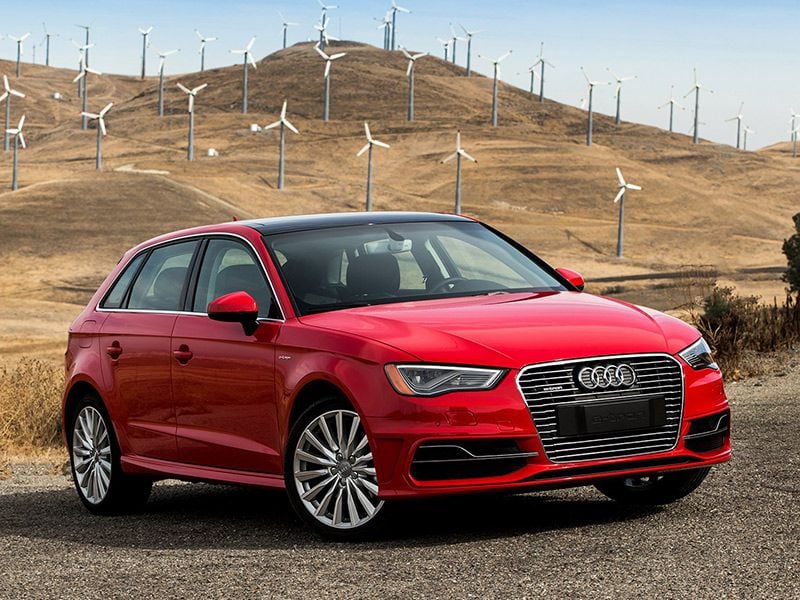
Photo by Audi